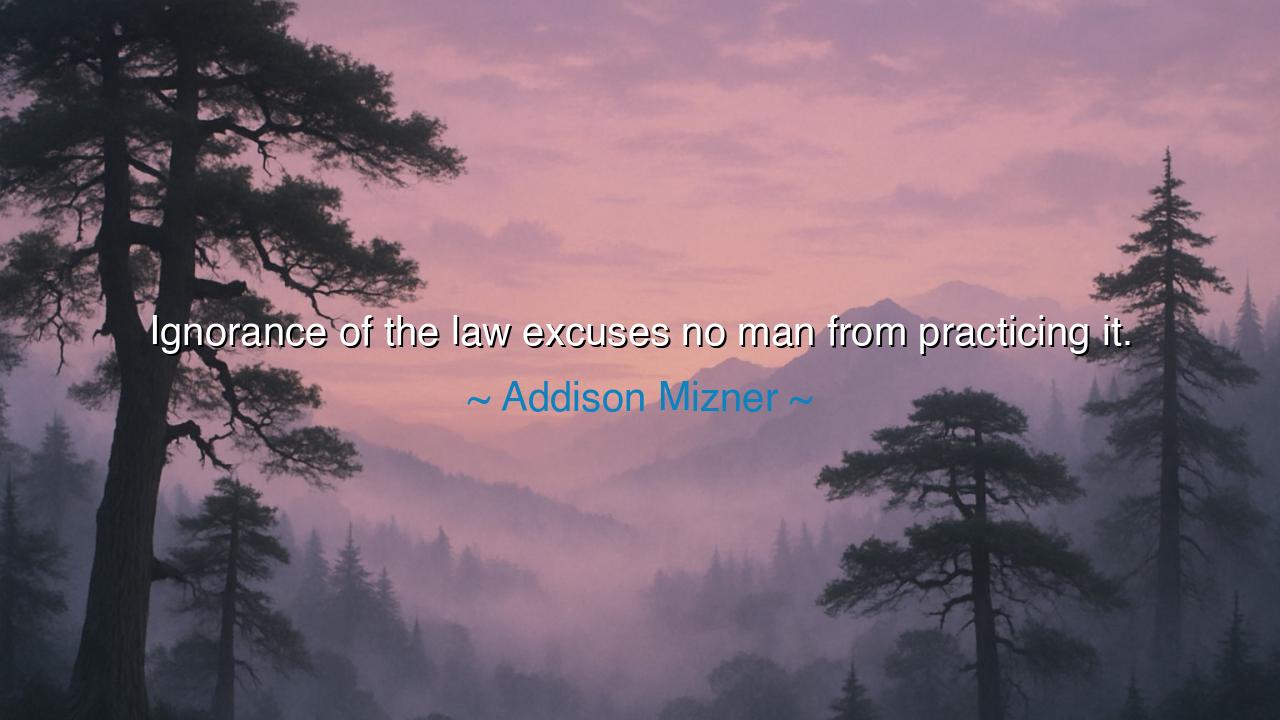
Ignorance of the law excuses no man from practicing it.






Hear the piercing wisdom of Addison Mizner, who declared: “Ignorance of the law excuses no man from practicing it.” This is not a gentle observation, but a stern reminder, as cold and sharp as iron. For Mizner, famed architect and wit, understood that life is governed not only by stone and wood, but also by unseen structures—laws of men, laws of nature, laws of conscience. To plead ignorance is to attempt escape from responsibility, yet responsibility cannot be escaped. The law, once written and established, binds all, whether known or unknown, remembered or forgotten.
The meaning of this saying lies first in the weight of law. A people cannot stand without order; a society cannot endure without rules to guide conduct. These rules, whether carved in tablets of stone or written in books of statute, are the foundation of peace. Yet men often say, “I did not know.” But Mizner rebukes such excuses. For just as fire burns the hand whether one knows its nature or not, so too does the law exact its consequence whether one has studied its words or lived in ignorance. Ignorance does not shield; it condemns.
This truth has echoed through history. In ancient Rome, citizens were bound by the Twelve Tables, the earliest codification of their laws. These tablets were placed in the public square so all might see them, ensuring that no man could claim innocence through ignorance. And yet, many who neglected to learn them found themselves punished regardless. The Romans understood what Mizner repeats: to live within a society is to be bound by its laws, and to ignore them is folly. The law does not bend for the careless.
Consider also the Nuremberg Trials after the Second World War. When confronted with their crimes, many of the accused declared they had not known, or that they were merely following orders. Yet the tribunal declared a higher truth: that law is not only national but universal, that crimes against humanity cannot be excused by ignorance. The defense of “not knowing” or “not intending” was shattered, and justice was carried out. This solemn example reveals that Mizner’s saying is not only about statutes of states but about moral law itself, which binds all men whether they acknowledge it or not.
The teaching, then, is twofold: first, that every citizen bears a duty to learn and honor the written laws of their land; second, that every human being bears a deeper duty to live according to the moral laws of justice, compassion, and integrity. To ignore either is to invite ruin. As a traveler must learn the paths lest he stumble, so must a man learn the laws lest he fall into guilt.
The lesson for us is clear: do not dwell in ignorance. Seek knowledge of the rules that guide your life. Understand not only what is written in the codes of men but what is inscribed in the heart of humanity. If you are a citizen, learn the duties of citizenship. If you are a parent, learn the duties of care. If you are a steward of the earth, learn the laws of nature, for they too exact a price when ignored. To neglect these duties is to walk blindfolded into a pit.
Therefore, take up this practice: study, reflect, and live with vigilance. Do not excuse your failings by claiming you did not know, but take responsibility to know what is required. For knowledge is within reach for those who seek it, and justice shows no mercy to those who refuse to learn. Mizner’s words are a call to awaken, to rise above ignorance, and to live as one who honors the laws that bind us together in peace.
So remember this saying: “Ignorance of the law excuses no man from practicing it.” Let it echo in your heart as both shield and sword. For the wise do not wait for punishment to teach them; they prepare their minds with knowledge, and their lives with discipline. And in so doing, they walk not in fear of the law, but in harmony with it, building a life of justice, honor, and strength.






AAdministratorAdministrator
Welcome, honored guests. Please leave a comment, we will respond soon